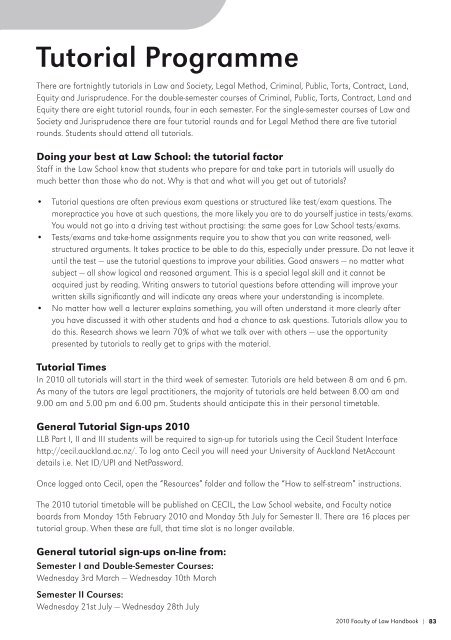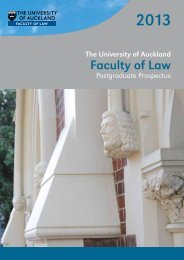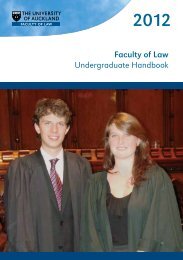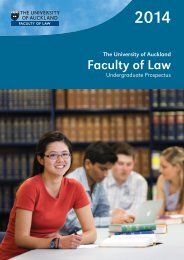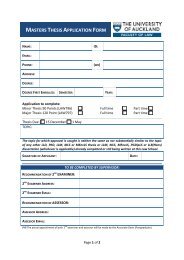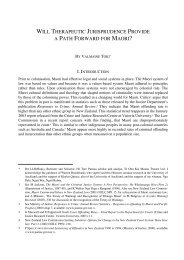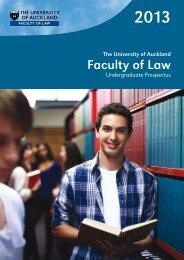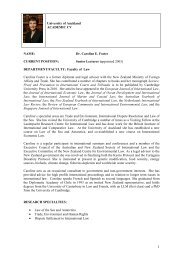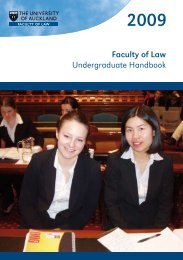Faculty of Law Undergraduate Handbook - Faculty of Law - The ...
Faculty of Law Undergraduate Handbook - Faculty of Law - The ...
Faculty of Law Undergraduate Handbook - Faculty of Law - The ...
- No tags were found...
You also want an ePaper? Increase the reach of your titles
YUMPU automatically turns print PDFs into web optimized ePapers that Google loves.
Tutorial Programme<strong>The</strong>re are fortnightly tutorials in <strong>Law</strong> and Society, Legal Method, Criminal, Public, Torts, Contract, Land,Equity and Jurisprudence. For the double-semester courses <strong>of</strong> Criminal, Public, Torts, Contract, Land andEquity there are eight tutorial rounds, four in each semester. For the single-semester courses <strong>of</strong> <strong>Law</strong> andSociety and Jurisprudence there are four tutorial rounds and for Legal Method there are five tutorialrounds. Students should attend all tutorials.Doing your best at <strong>Law</strong> School: the tutorial factorStaff in the <strong>Law</strong> School know that students who prepare for and take part in tutorials will usually domuch better than those who do not. Why is that and what will you get out <strong>of</strong> tutorials?• Tutorial questions are <strong>of</strong>ten previous exam questions or structured like test/exam questions. <strong>The</strong>morepractice you have at such questions, the more likely you are to do yourself justice in tests/exams.You would not go into a driving test without practising: the same goes for <strong>Law</strong> School tests/exams.• Tests/exams and take-home assignments require you to show that you can write reasoned, wellstructuredarguments. It takes practice to be able to do this, especially under pressure. Do not leave ituntil the test — use the tutorial questions to improve your abilities. Good answers — no matter whatsubject — all show logical and reasoned argument. This is a special legal skill and it cannot beacquired just by reading. Writing answers to tutorial questions before attending will improve yourwritten skills significantly and will indicate any areas where your understanding is incomplete.• No matter how well a lecturer explains something, you will <strong>of</strong>ten understand it more clearly afteryou have discussed it with other students and had a chance to ask questions. Tutorials allow you todo this. Research shows we learn 70% <strong>of</strong> what we talk over with others — use the opportunitypresented by tutorials to really get to grips with the material.Tutorial TimesIn 2010 all tutorials will start in the third week <strong>of</strong> semester. Tutorials are held between 8 am and 6 pm.As many <strong>of</strong> the tutors are legal practitioners, the majority <strong>of</strong> tutorials are held between 8.00 am and9.00 am and 5.00 pm and 6.00 pm. Students should anticipate this in their personal timetable.General Tutorial Sign-ups 2010LLB Part I, II and III students will be required to sign-up for tutorials using the Cecil Student Interfacehttp://cecil.auckland.ac.nz/. To log onto Cecil you will need your University <strong>of</strong> Auckland NetAccountdetails i.e. Net ID/UPI and NetPassword.Once logged onto Cecil, open the “Resources” folder and follow the “How to self-stream” instructions.<strong>The</strong> 2010 tutorial timetable will be published on CECIL, the <strong>Law</strong> School website, and <strong>Faculty</strong> noticeboards from Monday 15th February 2010 and Monday 5th July for Semester II. <strong>The</strong>re are 16 places pertutorial group. When these are full, that time slot is no longer available.General tutorial sign-ups on-line from:Semester I and Double-Semester Courses:Wednesday 3rd March — Wednesday 10th MarchSemester II Courses:Wednesday 21st July — Wednesday 28th July2010 <strong>Faculty</strong> <strong>of</strong> <strong>Law</strong> <strong>Handbook</strong> | 83


